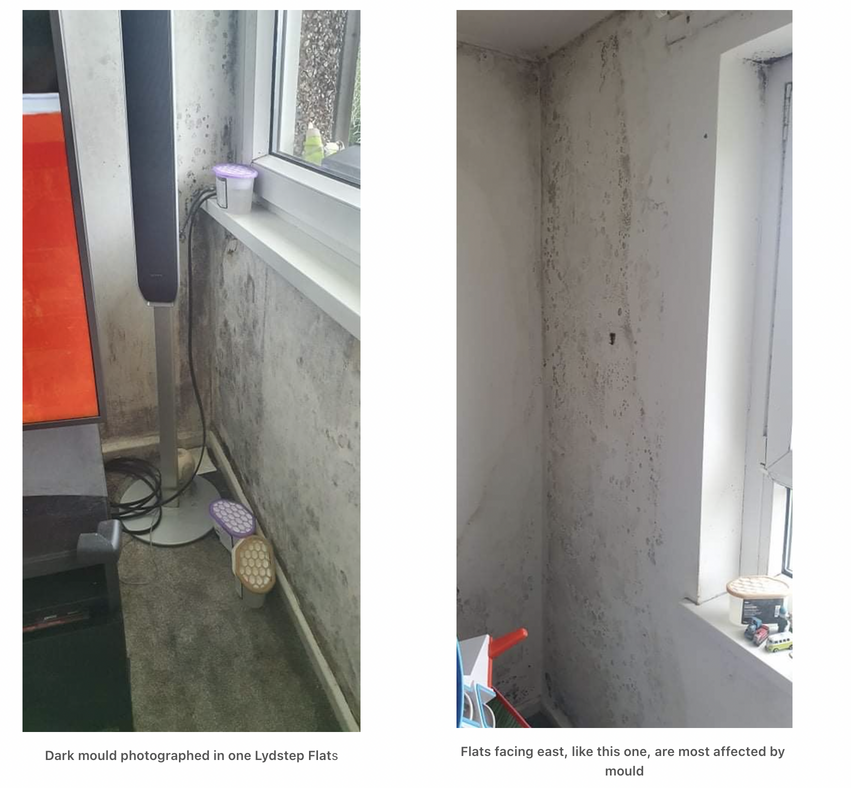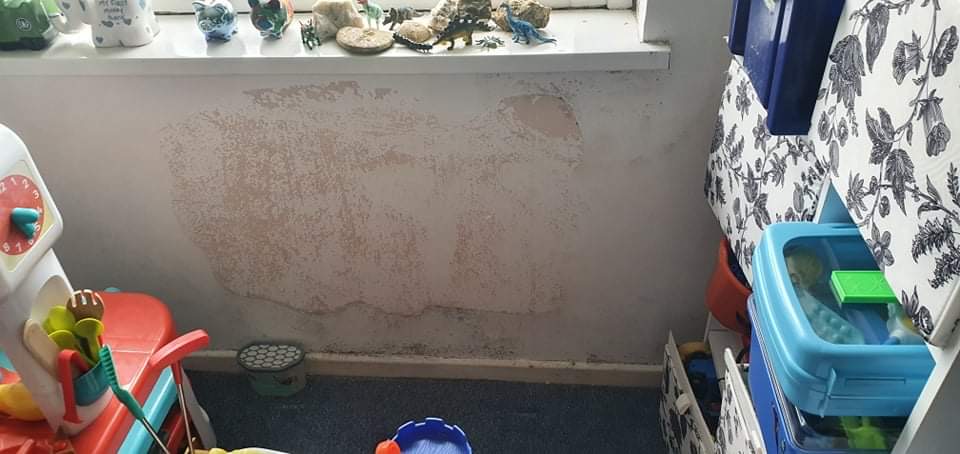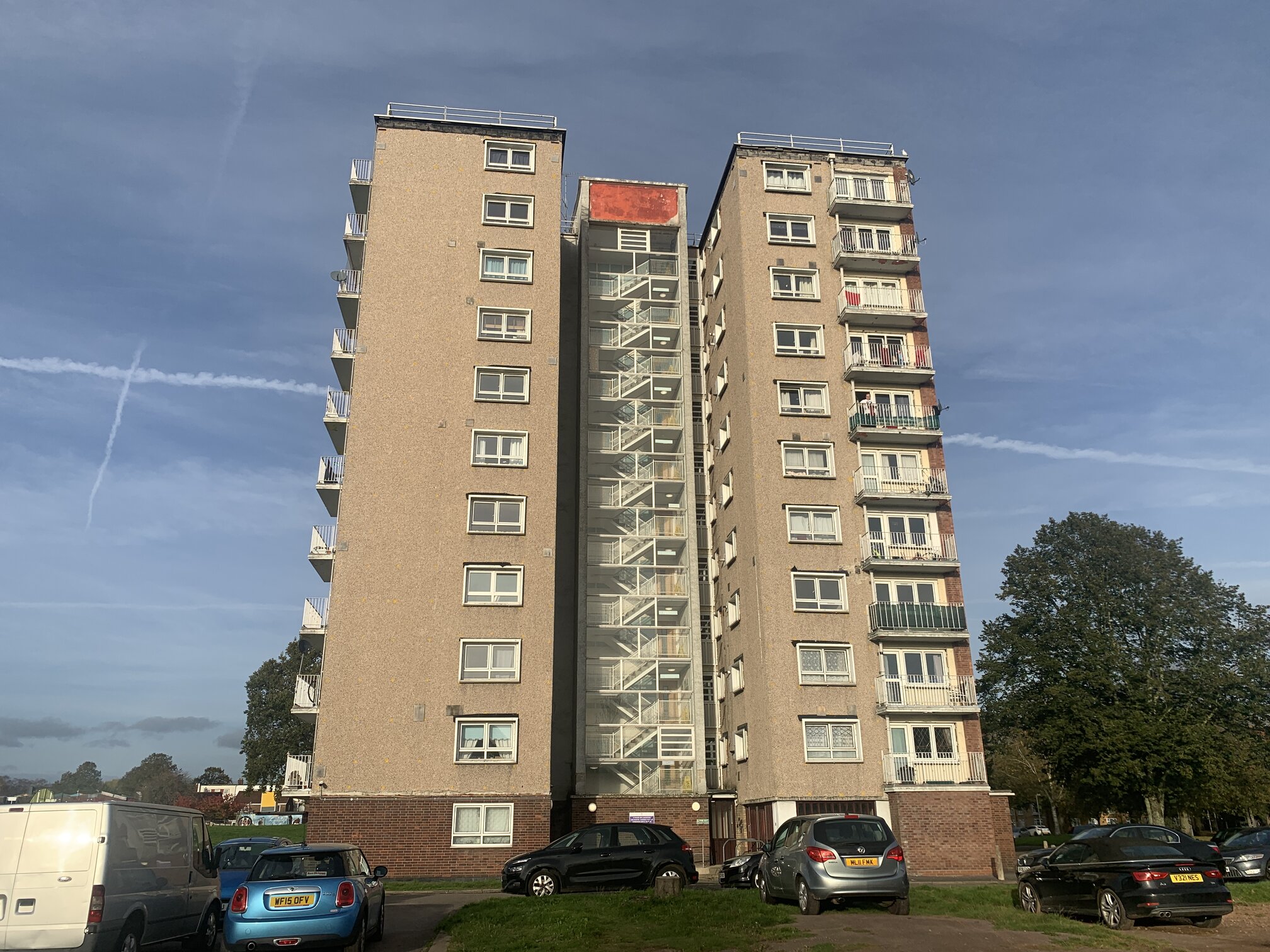Mould, damp, and cold temperatures worsening as third winter looms, say tenants
RESIDENTS of Lydstep Flats still face cold temperatures, mould and damp in their council housing, three years after the removal of cladding.
Cardiff Council removed the external insulation in November 2018 after the Grenfell fire. However, continuous changes to building regulations, the COVID-19 pandemic, and Brexit have caused what one councillor dubbed a “perfect storm” and led to years of delays.
As residents head into winter, they are still awaiting answers on when exactly the cladding will be reinstalled.
Cardiff Council have only said the process will begin “as soon as possible” and the recladding scheme should be completed by early 2023. This would be nearly five years after the cladding was first removed.
Naomi Moore, 39, has lived in Lydstep Flats for 10 years with her partner and two children.
Since she moved in, her family has dealt with mould, condensation on the windows, blocked drains, and broken lifts, along with cold temperatures. Many of these problems grew more severe when the cladding was removed.
Mrs Moore said: “Mould has always been an issue … but not as thick and extreme it has been since the cladding has come down, the cold wet weather has caused it to get extremely bad.

“It’s caused so much damage to our property and needs continuous attention. This I do put down to the cladding removal and leaving the building vulnerable to the elements. The building is cold and damp, but at least with the cladding on, it felt warmer and the mould wasn’t nearly as bad.”
Mrs Moore insisted that the problem be solved now, as the colder weather worsens living conditions.
She said: “This needs to be the last winter without the cladding as it’s physically and emotionally draining with having to deal with it.
“I feel I am failing my children with them having to live in these conditions.”
Councillor Jennifer Burke-Davies, who serves the Llandaff North ward, could not visit the flats in winter of 2018, the first season without cladding, because of maternity leave. She was shocked at the conditions when she returned in March 2019.
Coun Burke-Davies said: “I was taken aback by how quickly the mould had gotten in there and taken root. Some of the flats were horrific.”
This winter, the council is offering each tenant one payment of £250 to cover the cost of heating, which has risen from £150 per month.
However, Mrs Moore feels this solution is not enough.
“Every morning the windows are dripping wet and need to be dried several times a day,” she said. “They say we need to ventilate the rooms to help with condensation, but with two children and how cold, it is we don’t want to have windows open all the time.”
While Mrs Moore said the money towards heating “does help”, her heating is on daily because the windows are open frequently.
“The bills are adding up,” Mrs Moore said.

Despite consensus that residents are struggling, little can be done to accelerate the recladding process.
“When it comes to cladding, the council’s hands are tied to a certain degree,” Coun Burke-Davies said. “Legal requirements have to be met so that whatever goes on is the right substance and it’s sustainable, and it won’t cause other issues or additional costs in the future.”
Each change in government cladding regulations prompted more testing from local authorities. When regulations changed most recently in December 2020, Cardiff Council could not get its flats tested until August 13, 2021, eight months later, due to “great demand”.
On the delays, Cardiff Councillor Lynda Thorne, Cabinet Member for Housing and Communities, said: “It’s been beyond our control in a sense. Because the enquiry was taking place with Grenfell, it was a moving feast as they were discovering things.
“The government was constantly introducing legislation which was changing the nature of what we were doing.”
In hindsight, Councillor Burke-Davies feels things could have been done differently.
“If it was my decision, I don’t know if I would’ve taken the cladding off in November, but obviously there was a liability with having that improper cladding on the building any longer,” she said.
“I can appreciate why it was done. I guess it’s just a perfect storm that we’ve had delays.”
Due to delays, cost estimates for the Lydstep recladding scheme have doubled since early 2020, a rise of 103%, from £7.4m to £15.1m.
Cardiff council did briefly consider demolishing the Lydstep Flats but decided against because of the housing shortage in Cardiff.
The Lydstep Flats consist of three 11-storey apartment blocks with a total of 126 flats, housing a mix of private and council tenants.
However, as Coun Thorne said: “The problem is we have 8,000 people on the waiting list with only 1,000 properties becoming available a year, so you’d have this added pressure with adding the residents of another 250 to 300 flats and finding suitable accommodation to move them to.
“People are sometimes on the waiting list for three to five years.”
Coun Thorne said the emotional reaction to watching the Grenfell fire on the news influenced the council’s decisions. The tragedy, which occurred on June 14, 2017, saw 72 people killed and more than 70 injured.
“Had we known the difficulties that we were going to face replacing the cladding, we might have given it more thought whether to remove it immediately because it wasn’t the same sort of issue as Grenfell, she said.
Coun Thorne continued, “Once everyone saw that fire and how many lives were lost, our concern was in terms of the safety of tenants, and what we didn’t want was a repeat of Grenfell.”
Despite this, the councillor is disappointed at the state of the Lydstep Flats.
“I think we’ve done everything we possibly can,” she said. “Is it acceptable to tenants? If I were them, I would think no. It is so frustrating and disappointing.”



